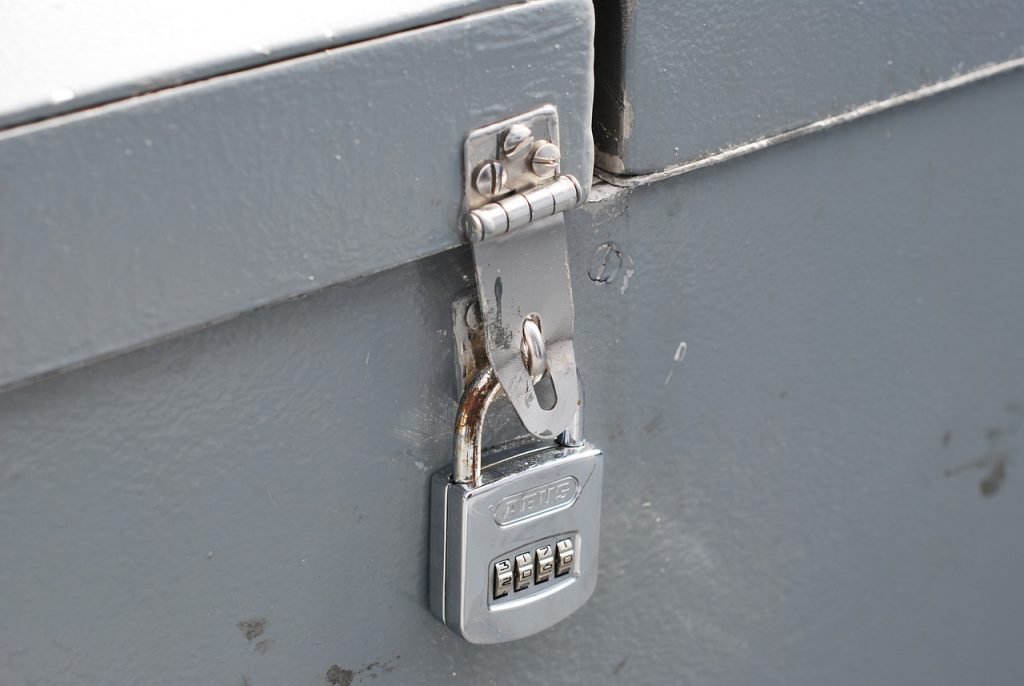Change
A Seeking Pharisee Transformed (Part II)
 An encounter with Jesus is life-changing, and this is what Nicodemus experienced after his encounter with Jesus! He no longer could be the Pharisee that others expected of him. Similarly, Jesus changes our lives, and we no longer can be the person others expect us to be.
An encounter with Jesus is life-changing, and this is what Nicodemus experienced after his encounter with Jesus! He no longer could be the Pharisee that others expected of him. Similarly, Jesus changes our lives, and we no longer can be the person others expect us to be.
…
False Security (Part I)
John the Baptist came on the scene declaring that the Kingdom of God was near. He preached a message of repentance and baptized those who confessed their sins. However, he had a different towards the Pharisees and Sadducees. He called them brood of vipers! He saw them as individuals who had false security in their state of spirituality! They should have been showing evidence of repentance by the fruit they produced rather than relying on their status or family history. It is easy to develop false security based on external factors but not have a close relationship with the Lord. …
God’s Rest and Work (Part II)
It’s Time to Change! (Part III)
Now as He drew near, He saw the city and wept over it, saying, “If you had known, even you, especially in this your day, the things that make for your peace! But now they are hidden from your eyes. Luke 19:41-42
…because you did not know the time of your visitation.” Luke 19:44b
Jesus was walking the streets of Jerusalem and saw a group of people who were missing their Messiah! They had all the right words and did all the religious ceremonies, but they were not expecting the Messiah in their midst. They had become so used to their routine that anything out of ordinary didn’t cause them to pay closer attention to the one who came to save their souls!
The scripture tells us that Jesus wept over Jerusalem because they missed God’s visitation! During this time in the history of Israel, the Lord had not spoken to His prophets for four hundred years, so they had lost the vision that the coming of the Messiah could happen in their lifetime. They may have had an intellectual understanding that Messiah was going to come, but they were not necessarily expecting it in their generation. Furthermore, their ideas of a Messiah were carnal. They thought of someone who could rescue them from the hands of Roman oppression. However, this time God was not working on their political freedom but their spiritual freedom!
Many of us have had grandparents, parents, or friends who cried out on our behalf to pay attention to the Lord. There are people that we also are praying for that they would not miss God’s visitation. It is easy to miss God’s visitation in a culture that is so busy with its goals and plans in life. We don’t slow down to seek the Lord for our daily wisdom and direction. Instead, we bring our agenda to Him and ask Him to bless it.
There are times that God changes the seasons and He wants us to be in tune with the change. There are things that are meant to bring peace to our lives, but it requires us to value God’s direction and instruction even when it is inconvenient or uncomfortable! There are times that God wants us to stop from doing certain things or going in a certain direction. At other times, He may tell us it’s time to reconcile a relationship. He tells us to pick up the phone and call that person that we have not spoken to in years. This is when we stop arguing with God and do what He tells us to do. We can be masters of justification, but have you noticed that God does not buy our excuses!? Every time the Lord touches an area of our lives, we should celebrate it as a day of visitation from the Lord because He is about to change us and deliver us from something that has held us in bondage!
Are you open and available to God’s visitation? Can He interrupt your plans today? Will you change direction if He tells you to do so? Are you willing to change your vocabulary and how you speak about yourself or others? Will you pick up the phone and reach out to someone you have not spoken to in months or years? We pray for God’s kingdom to come and His will to be done on earth as it is in heaven. Are we making ourselves available for God to visit the earth by using us as conduits of His will on the earth!?
It’s Time to Change! (Part II)
Now as they heard these things, He spoke another parable, because He was near Jerusalem and because they thought the kingdom of God would appear immediately. Therefore He said: “A certain nobleman went into a far country to receive for himself a kingdom and to return. So he called ten of his servants, delivered to them ten minas, and said to them, ‘Do business till I come.’ But his citizens hated him, and sent a delegation after him, saying, ‘We will not have this man to reign over us.’
“And so it was that when he returned, having received the kingdom, he then commanded these servants, to whom he had given the money, to be called to him, that he might know how much every man had gained by trading. Then came the first, saying, ‘Master, your mina has earned ten minas.’ And he said to him, ‘Well done, good servant; because you were faithful in a very little, have authority over ten cities.’ And the second came, saying, ‘Master, your mina has earned five minas.’ Likewise he said to him, ‘You also be over five cities.’
“Then another came, saying, ‘Master, here is your mina, which I have kept put away in a handkerchief. For I feared you, because you are an austere man. You collect what you did not deposit, and reap what you did not sow.’ And he said to him, ‘Out of your own mouth I will judge you, you wicked servant. You knew that I was an austere man, collecting what I did not deposit and reaping what I did not sow. Why then did you not put my money in the bank, that at my coming I might have collected it with interest?’
“And he said to those who stood by, ‘Take the mina from him, and give it to him who has ten minas.’ (But they said to him, ‘Master, he has ten minas.’) ‘For I say to you, that to everyone who has will be given; and from him who does not have, even what he has will be taken away from him. But bring here those enemies of mine, who did not want me to reign over them, and slay them before me.’ ” Luke 19:11-27
I am continuing with the stories in Luke 19 as the Lord calls us to change in various areas of life! In the last devotional, I shared about Zacchaeus and how the acceptance of Jesus caused him to change his way of life!
In the above parable, the master decided to give different amounts of talents to his servants. The issue was not equality but stewardship. The first two servants stewarded well what was allotted to them and increased what was given to them. The master was pleased with both of them and gave them even more to manage. However, the third servant hid his mina and did not do anything out of fear of the master.
What Jesus addressed in this parable was not performance but stewardship. The scripture tells us that every good and perfect gift comes from above (See James 1:17). When the Lord blesses us, it is not just for ourselves; we are not called to hoard it but to be an outlet. The person who has been anointed by God has a responsibility to use it according to the Lord’s instructions and to be a channel of God’s blessing. God’s gifts are not just for us, and we cannot be selfish with them. We should be open and available to use them and be a blessing as God has blessed us.
In the above parable, the master expected a return on his investment, but the third master was fearful and did not trust his master’s character. Whenever fear comes in, it sucks faith out of people’s lives and they no longer want to follow God where He leads. The flesh wants to do what is safe and convenient. Interestingly, fear can project itself as wisdom! We need to seek the Lord and allow Him to show us if our hesitation is due to fear or wisdom.
We don’t control the level of fruitfulness and multiplication, but we need to be faithful in sowing, nurturing, and putting to work what the Lord has blessed us with. Then in due season, God brings the increase, and we can reap a harvest because we have been diligent and unafraid to put to work what He has given us.
Is there anything that you have been afraid to begin? Ask the Lord to show you the reason behind the fear. Allow the Lord to speak to you and move forward. It’s time to change and not hide behind fear!
Image by Gerd Altmann from Pixabay
It’s Time to Change! (Part I)
Then Jesus entered and passed through Jericho. Now behold, there was a man named Zacchaeus who was a chief tax collector, and he was rich. And he sought to see who Jesus was, but could not because of the crowd, for he was of short stature. So he ran ahead and climbed up into a sycamore tree to see Him, for He was going to pass that way. And when Jesus came to the place, He looked up and saw him, and said to him, “Zacchaeus, make haste and come down, for today I must stay at your house.” So he made haste and came down, and received Him joyfully. But when they saw it, they all complained, saying, “He has gone to be a guest with a man who is a sinner.” Then Zacchaeus stood and said to the Lord, “Look, Lord, I give half of my goods to the poor; and if I have taken anything from anyone by false accusation, I restore fourfold.” And Jesus said to him, “Today salvation has come to this house, because he also is a son of Abraham; for the Son of Man has come to seek and to save that which was lost.” Luke 19:1-10
Through His journey through various towns and villages, Jesus passed through the town of Jericho. Jericho was the Promised Land that the Israelites received when the Lord instructed Joshua and his people to march around the city seven times. Through their obedience, God made the walls of Jericho fall! However, over the centuries and due to Israel’s disobedience, they lost sovereignty of those lands, and now it was under the Roman Empire.
In this passage, we need find Zacchaeus who was a Jewish man living in Jericho shunned by his own people because he had decided that his success was going to come from collecting taxes from his fellow Jewish people. He used extortion as a means of living in the so called Promised Land. In reality, he had lost his true identity until he met Jesus!
Despite Zacchaeus’ sins against his countrymen, Jesus chose to spend time with him in his house. He saw Zacchaeus as a lost sheep who needed to come back to the flock. Jesus did not seek the Pharisees because they did not see themselves as sick or in need of help. They probably had the respect of people even if it was superficial, so they did not find themselves in desperate need to change anything in their lives! However, while Zacchaeus had his wealth, he did not have the respect of his countrymen. I wonder if he had any friends except his fellow tax collectors. His only friendships may have come from those who also had had chosen to sell themselves, for a bowl of proverbial stew, to the Roman Empire.
When Jesus called Zacchaeus’s name and went to his house, it changed everything for him! On the one hand, Zacchaeus must have felt special and accepted, but on the other hand, his sins must have been right before his eyes. What if he used the beautiful dishes of a widow who had to given up her wedding gift to pay her taxes!? What if the rug they were sitting on came from a family of six who could not afford to pay their taxes!? What if the beautiful picture on the wall had have come from a son who gave up that which he had inherited from his father to pay his taxes!? Every place Jesus looked upon, could have brought to Zacchaeus, the memory of how he obtained those beautiful items. Finally, Zacchaeus could not stand it any longer. He wanted to get his life right with the Lord and enjoy the peace and the rest of God. Jesus’ acceptance had caused all these beautiful things to lose their value and luster. He was ready to give it all up and keep the joy and acceptance that he received in being with Jesus!
This is how Jesus works in our lives as well. He doesn’t come making demands of us to give up our sins, but He comes with His piercing eyes and a heart of love! He looks at us with acceptance and concern. In His eyes, we see that we are far more valuable than selling ourselves to a worldly version of success and acceptance! His concern is that we are genuine and vulnerable with God and are not just trying to play the role of a good Christian!
When we give Him room to come into our hearts, we cannot stand having Jesus walk around the various rooms and see the stuff that are contrary to His desires. The conviction rises up and we feel like it’s time to change! I don’t want Jesus to look at things that make Him uncomfortable to be here! He is worthy for me to let go of anything that does not please Him! How about you? If Jesus were to come to your home, what will he see? What has to change for Jesus to feel welcome in your life?
Image by Gerd Altmann from Pixabay
The Spirit of Fasting (Part II)
Fasting is a form of sacrifice. While it is not easy to fast, after doing it regularly, it may not be as difficult as it used to be. This can lead us to be happy with the habit of fasting rather than focusing on our spiritual growth during the fast.
Why have we fasted,’ they say, ‘and You have not seen?
Why have we afflicted our souls, and You take no notice?’
“In fact, in the day of your fast you find pleasure,
And exploit all your laborers.
Indeed you fast for strife and debate,
And to strike with the fist of wickedness.
You will not fast as you do this day,
To make your voice heard on high.
Is it a fast that I have chosen,
A day for a man to afflict his soul?
Is it to bow down his head like a bulrush,
And to spread out sackcloth and ashes?
Would you call this a fast,
And an acceptable day to the Lord? Isaiah 58:3-5
In the book of Isaiah, we see that the Lord was not impressed with people’s fast. Sackcloth, ashes, and affliction did not move Him.
We have a tendency to focus on sacrifice rather than our disposition. Sacrifice can be external works to show our desire to follow God. While making sacrifices is part of our walk with the Lord, it is not the basis of our relationship with Him. Otherwise, we run in the danger of performing for God all over again.
In the above passage, God saw people’s strife and doing what pleased them while they were still fasting. I wonder what they were debating about!? Could it be that they thought since they fasted they had the right to speak from the position of authority and challenge others? Fasting is not meant to make us feel more spiritual than others. It is also not meant to be a vehicle of competition. God was not pleased with their attitudes.
One of the ways that we can deny ourselves is to take the opportunity on our fasting days and work on our weaknesses. For example, if you have a tendency to gossip, be intentional to stay out of conversations that could lead to gossip. If you have a tendency to be harsh and domineering, practice gentleness and flexibility. If you worry too much, practice praising and worshipping the Lord and staying in faith. If stress is your weakness, meditate on scriptures that give you rest and allow Him to be your peace. If social media is a weakness, get off of it during your fast and meditate on the Lord! If heaviness is something you struggle with, be intentional about joy and finding things that make you laugh. If you have a tendency to easily get offended, make it a point to guard your heart and forgive quickly without holding any grudges.
The Lord cares about our heart condition more than the sacrifices we make in fasting. We can use our fasting days to not only deny our flesh from food but feed our spirit man with what pleases Him. We all have areas of improvement. Ask the Lord to show you an area that you can work on when you fast next time. I will continue with this subject in the next devotional.
Image by silviarita from Pixabay







